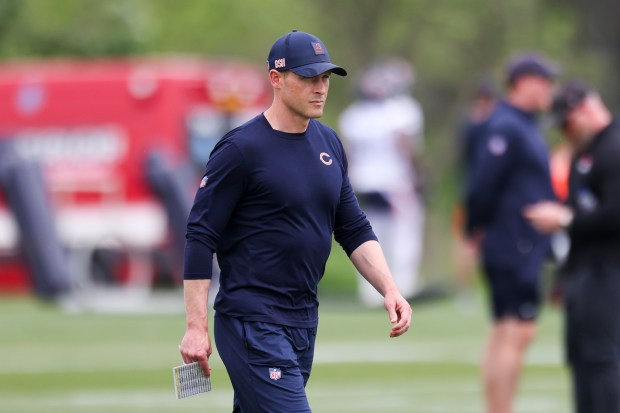As a scientist, I view every animal behavior as a crucial data point, revealing an animal’s well-being through the collective story they tell. After 25 years in the wildlife world, this skill is finely tuned. That’s why watching the HBO docuseries “Chimp Crazy,” from the producers of “Tiger King,” is so distressing. The image the data points paint of these chimpanzees and monkeys is a terrifying picture.
Primates are not pets. Raising them inappropriately and without others of their kind leads to poor welfare for the animal and can be dangerous for the humans, too.
The most recent episodes of “Chimp Crazy” revisit two incidents of pet chimpanzee attacks on humans: chimpanzee Travis and Charla Nash, and chimpanzee Buck and Tamara Brogoitti’s daughter. Both of these attacks were horrific, resulted in near-fatal human injuries and devastatingly ended in the killing of the chimpanzees by gunfire.
Primatologists and animal welfare experts, including those here at Lincoln Park Zoo, will tell you that chimpanzees are only small, cuddly and pliable for the first few years of what may be a 50-year-plus life span. Around age 6, chimpanzees go through puberty. They grow to about 175 pounds and move through the world with undeniable self-determination and incredible power — both of which can be very dangerous. Chimpanzees are so muscle-dense that they are unable to swim. So, while what happened to Nash and Brogoitti’s daughter is undoubtedly tragic, it was also avoidable.
Steve Ross, a renowned primatologist and my late husband, understood this deeply. After the Travis incident, as director of Lincoln Park Zoo’s Lester E. Fisher Center for the Study and Conservation of Apes, Steve founded Project ChimpCARE to map the location of every chimpanzee living in the U.S. What began as an effort to improve chimpanzee welfare evolved into the definitive source for chimpanzee location data, supporting zoos, animal protection groups and sanctuaries. Today, it reveals there are still many chimpanzees living in dire conditions, similar to Tonka’s in “Chimp Crazy”: separated from their mothers, isolated or confined indoors.
Tonia Haddix, the central figure of “Chimp Crazy,” shares that she makes her money as an exotic pet broker. She sells these cognitively complex, social creatures as if they are the latest fashion trend. On the show, she is seen transporting and bottle-feeding infants, which is heartbreaking, knowing the intensity of the maternal bonds of primates. Haddix agrees. In the first episode of the show, she says for baby chimpanzees, “their mother is their whole life,” and it’s an incredible experience to adopt one and take on that role. She somehow misses the hypocrisy of the statement — these chimps must be pulled away from their actual mothers, often at only days of age, to be raised by humans. Given chimpanzees share 98.8% of their DNA with humans, it is easy to empathize with these distressed mothers and their stolen infants.
Haddix also claims she makes money selling these animals to zoos. Let me be clear: There are good zoos and bad zoos, and there are good sanctuaries and bad sanctuaries. Good zoos and sanctuaries in the U.S. are accredited and held accountable by the Association of Zoos and Aquariums or the Global Federation of Animal Sanctuaries. The “zoos” Haddix is talking about are roadside zoos that operate purely for profit and without any care or welfare standards. If you can snuggle a baby tiger or prop a spider monkey on your shoulder, you are supporting an unaccredited facility.
Research estimates there are more than 15,000 other primates such as capuchins, spider monkeys and lemurs living as pets or as “actors,” for instance, in the entertainment industry today. (How is the capuchin monkey in Apple TV’s “Bad Monkey” series living when it’s not on camera?) They don’t get as much attention as their bigger cousins, but they are just as affected. Plus, being smaller, they are easier targets for illegal wildlife traffickers. With more than 60% of wild primate populations facing the threat of extinction, it is hard to justify their use for entertainment.
Lincoln Park Zoo scientists helped author studies in 2011, 2015 and 2023 that show that when people see images of monkeys and apes being held by humans, in human clothing or in human settings, no matter the caption or context, interest for these animals as pets increases — and so do incidences of illegal trafficking. According to a recent article from conservation news site Mongabay, for every one gibbon that becomes a pet, seven are killed in the wild to acquire it.
Lincoln Park Zoo and a coalition of animal protection organizations, from the Humane Society of the United States to the North American Primate Sanctuary Alliance and the International Fund for Animal Welfare, are working together to end the practice of humans owning primates as pets. We have rallied around the Captive Primate Safety Act, legislation that would federally prohibit the private ownership of primates as pets.
Anyone can be a champion for primates. Be cognizant of the videos you consume on social media. Visit only accredited zoos and sanctuaries. Come visit Lincoln Park Zoo and see chimpanzees living in groups, grooming one another, wrestling, termite-fishing and pant hooting.
Let’s raise our voices and let primates be primates, not pets.
Megan Ross, Ph.D. is president and CEO of Lincoln Park Zoo.
Submit a letter, of no more than 400 words, to the editor here or email letters@chicagotribune.com.



